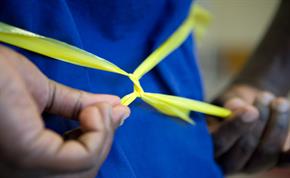
Following the recent cases of imported ebola in Spain and the USA, the Department of Health has emphasised the need to remain vigilant for possible cases of viral haemorrhagic fever (VHF) in this country. To date, there have been no cases of ebola in the UK and the latest information is that the risk remains low of cases being found here.
We must be aware of any patient who presents with the following:
The use of strict IPC precautions, hand hygiene and personal protective equipment (PPE) is required for suspected cases:
Please remember that the virus may be present in blood; body fluids, including urine; on contaminated instruments and equipment; in waste; on contaminated clothing; and on contaminated surfaces.
A huge amount of work has already been carried out to ensure staff have the necessary information and equipment to protect themselves and patients should any actual or potential cases be found. Steve Wheaton, Assistant Chief Ambulance Officer, said: “It is important that all operational staff ensure they make themselves familiar with the procedures for dealing with patients who show the symptoms of ebola and the correct procedure for using the specialist PPE. By all working together we can ensure that we protect ourselves and our colleagues and ensure that patients are treated appropriately.”
Trust Chief Executive, Anthony Marsh, added: “As a Trust we are committed to ensuring that staff are fully protected and prepared to deal with any cases of ebola safely should they occur in the east of England. It is at the top of our agenda to make sure all staff are fully trained and equipped and have the support required from their local and regional management teams.”
Action cards will be available on all frontline vehicles within the next seven days and managers are ensuring that PPE is now stored on all marked emergency vehicles which should be used for low risk patients.
Emergency preparedness managers and HART have already been issued PPE for high risk patients that will be issued to staff at the incident. Duty locality officers will shortly receive the same equipment. Staff should note that they will not be asked to transfer any confirmed ebola cases to specialist hospital care; this will be carried out by the HART team using specialist equipment.
Further work is ongoing in regard to establishing the appropriate level of protective equipment required for the likes of PTS, CFRs and BASICS doctors, which will be completed within the next few days.
If you have any concerns or questions, please contact your local resilience manager who will be able to provide the answers to any questions you might have.
Public Health England has produced a number of other Ebola guidance documents, which can be found on their website. The World Health Organisation (WHO) also have lots of information on the dedicated Ebola pages on their website.
New information will be published on Need to Know when necessary.
Published 16th October 2014